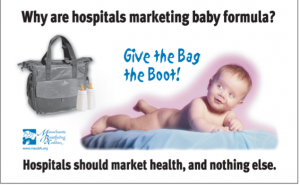The 2023 Lancet Series on Breastfeeding explores how the value of breastfeeding is wasted by governments and public health, and how the vulnerabilities of women and children are exploited by the commercial milk formula (CMF) industry.
The 3-part series explores the strategies used to target vulnerable parents, reveals formula puffery claims made with little or no supporting evidence, exposes sophisticated digital marketing platforms, and discusses industry lobbying efforts to influence policy and weaken the Code. Breastfeeding is the major competitor of infant formula. Analysis carried out in this Lancet series showed that for each additional kilogram of standard formula sold per child each year, breastfeeding was 1.9 percentage points lower. Recommendations are put forth to address the $55 billion industry that the formula marketing playbook so effectively supports.
Continue reading



